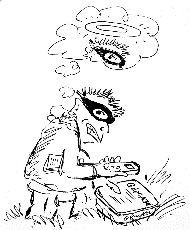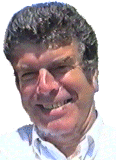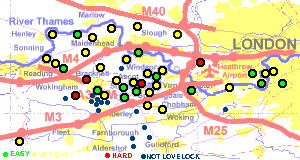

 A GeoTrasher is someone armed with the same tools as GeoCachers
- a GPS and access to the Net, but who uses these to interfere
with caches, or the contents of caches. He may already be a very
active Geocacher, but for some reason decides to target particular
caches. He might hide the cache in another location, so even
the cache planter won't find it. He might even think that he is
"doing the right thing".
A GeoTrasher is someone armed with the same tools as GeoCachers
- a GPS and access to the Net, but who uses these to interfere
with caches, or the contents of caches. He may already be a very
active Geocacher, but for some reason decides to target particular
caches. He might hide the cache in another location, so even
the cache planter won't find it. He might even think that he is
"doing the right thing".
Don't know what Geocaching is ? - see www.gpshobby.info
A GeoTrasher will probably simply move and hide the cache up to 100 yards from it's published position. This should be enough to ensure that even the cache planter will not find it. He will also be confident that he cannot be accused of "stealing". More subtle forms of GeoTrashing might involve tearing particular pages out of the log book, or scattering the cache contents to imitate a visit by "schoolboys". However, simply moving the cache is the most likely behaviour - and potentially the most disruptive, since a well hidden cache in grass or heather might take time for even the cache owner to find, armed with his GPS giving 5m or better accuracy. It will therefore take even longer to confirm that the cache is missing. Meanwhile, quite a few Geocachers could have their fun spoilt, searching for a cache that is no longer there.
GeoTrashing may become a serious problem as GPS become more popular - maybe as widespread as mobile 'phones are among children now. Future mobile 'phones will include GPS anyway: some do already. It only needs one Geotrasher within 50 miles to spoil the enjoyment of others - both by his direct action and the risk of sparking off similar behaviour in other Geocachers.
Right now the GeoTrasher is likely to be motivated by one or more things :
Not easy - unless he admits to it privately or publicy - such as a threat or boast on a geocaching newsgroup; or he is observed doing it through binoculars or a video camera. He is likely to be very sensitive about revealing his true identity, and will probably prefer to hide behind a pseudonym when talking about this subject on a newsgroup. But there are, of course, many people who - rightly or wrongly - prefer to remain anonomous when speaking publicly. If we are honest with ourselves, we are probably ALL capable of GeoTrashing: the important thing is to resist the temptation, and recognise our folly if we HAVE done it.
It cannot be stopped, of course: but perhaps it may be deterred by how caches are planted, or the procedures by which cache information is obtained - which may involve the Geocacher revealing his identity to the cache planter and/or the landowner. The most effective way of preventing it happen will probably be to "grin and bear it", to plant more caches, and not to encourage similar behaviour in others. This responsability falls on all of us, particularly those who administor Geocaching web sites and Newsgroups. If these people are seen to condone the action, for whatever reason, there is great risk that this rather anti-social behaviour will spread.

 Robin Lovelock put up this page in February 2002 after it appeared
that he and his wife June had been the victim of GeoTrashing.
Most observors will agree that the evidence is overwhelming, and
that this practise should not be condoned - for any reason.
Robin Lovelock put up this page in February 2002 after it appeared
that he and his wife June had been the victim of GeoTrashing.
Most observors will agree that the evidence is overwhelming, and
that this practise should not be condoned - for any reason.
You may read more about the 35+ Lovelock caches on www.gpss.co.uk/geocache and on the "big picture" of geocaching, including proposed ethics, on www.gpshobby.info
You will be pleased to know that Robin and June are not disheartened by so many of their caches, complete with cameras and log books, having gone missing. A few will certainly have been "natural wastage" due to them having been found by "schoolboys".
There have been sufficient cases of the public finding caches by accident, and entering into the spirit of the hobby by taking a picture and filling in the log book, to more than compensate for the dismay caused by this recent saga. Perhaps the best example is the Richmond Park cache, which became exposed and was then "visited" by some 15 groups of people. Follow the link above and see the pictures :-) Richmond Park was selected as the location for BBCWorld to make the recent feature on Geocaching - also mentioned.